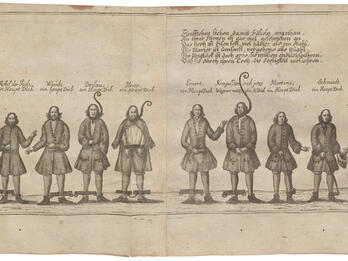Discorso circa il stato de gl’Hebrei et in particolar dimoranti nell’inclita Città di Venetia (Discourse Concerning the Condition of the Jews, and in Particular Those Living in the Illustrious City of Venice): On Jewish Commerce
The Hebrews have been taught and instructed more than any other nation in the school of hardship under the rigorous discipline of that necessity, because they are deprived of real estate,1 forbidden to engage in manual activities, far from the profits of the courts and other urban occupations, and burdened with families since celibacy is prohibited also by their rites. As a result, it is necessary for them to find the way to their own maintenance and support with industrious diligence and careful vigilance. Therefore, it can be seen that wherever Jews have dwelled, trade and business have flourished, as Livorno can attest. And the city of Venice will never forget the first originator of the port of Spalato, [Daniel Rodriga,] a Jew of the Nation who with his memoranda diverted the trade of a great part of the Levant to the city with the result that that port now being considered the most firm and solid foundation of trade that the city has, for that route of sending goods prevails over the others because the land is much more safe and less exposed to the ravages of fortune than is the sea.
But it is notable regarding the capital of other Hebrews who find shelter in alien dominions (as I have mentioned in the preceding consideration) that they send large sums to the Hebrews of the city, for they are satisfied with every small profit and gain that they derive from it, since they do not send it to Venice for the advantage of that profit that they hope is greater in this market-place than in another but only to avoid those dangers that could easily occur if they retained it with them. But those who have employment other than trading for every slight diminution of gain in commerce, distance themselves from it and engage in other occupations of greater profit.
Getting down to specifics in this matter, it is well known among merchants that commerce is attracted to a city, and especially a maritime one, in three ways: first, by means of its own ships, for those who possess vessels are likewise masters of trade as one perceives among the Flemish; second, by persons moving to diverse market-places, for in this manner, friendship and relationships are formed; third, by sending their own capital to different places and so inviting and inducing others reciprocally send their own wealth to the city.
As far as the sailing of their own vessels is concerned, the Hebrews are almost entirely deprived of them, although in Amsterdam, Rotterdam, and Hamburg some own shares in vessels. As for travelling and forming new business dealings, the Hebrews do not yield to anyone, since they do not have the opportunity to live in their own country to cultivate lands or to engage in other urban professions that are prohibited to them. To this it should be added that they have large families since celibacy is not permitted, as a result of which some are involved in domestic concerns, while others readily devote themselves to wandering in long voyages in which they introduce new business from foreign and remote countries to the city in which they originally located their domicile.
Then in sending their capital throughout the world, the Hebrew can, more than all others, engage in business, not only on account of the urgent need that stimulates him to try the favor of Fortune by every means, but because his own wealth is not invested in real estate but in ready cash and merchandise, on account of which they are ready and disposed to be scattered and go wherever it seems best and pleases them. And it is worth noting how much benefit this last way brings, being practiced in all that area of land that lies between Dalmatia and Constantinople and other places under Turkish rule where no Venetian consul resides as in the other ports of the Levant where public representatives dwell, for it does not suit the Venetians to send their capital into the hands of the Turks or their Greek subjects, or even to their own correspondents on account of dangers and losses that could easily befall them in those places, since they do not have there any protector who will defend them from the abuses of those people.
But the Hebrews, either driven by the necessity to live or because other Hebrews, indeed the greater part of their nation, are subject to the Turk, do fearlessly go there in person and send their wealth and possessions there, and there is no doubt that the wandering and moving of persons are the causes of commerce, and although it cannot be denied that the temperateness of the air and the location of countries are great inducements to commerce and business, nevertheless the voluntary coming together of men are a most effective cause of it.
Notes
The Venetian decrees of 1423 and 1424 forbade Jews from owning real estate, dwellings or other buildings.
Credits
Simone Luzzatto, “Discorso circa il stato de gl’Hebrei et in particolar dimoranti nell’inclita Città di Venetia (Discourse on the Condition of the Jews, and in Particular Those Living in the Illustrious City of Venice),” trans. Benjamin Ravid, unpublished. Translated from the Italian, from Simone Luzzatto, Scritti politici e filosofici di un ebreo scettico nella Venezia del Seicento, ed. Giuseppe Veltri (Milan: Bompiani, 2013), pp. 20–23. Used with permission of the translator.
Published in: The Posen Library of Jewish Culture and Civilization, vol. 5.




